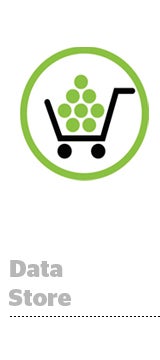 As brick and mortar giants like Walmart and Tesco do more to monetize their customer data, the question becomes – will they go it alone or maintain third-party partnerships?
As brick and mortar giants like Walmart and Tesco do more to monetize their customer data, the question becomes – will they go it alone or maintain third-party partnerships?
Tesco subsidiary dunnhumby’s rumored purchase of demand-side platform Sociomantic is the most obvious example of a seismic shift that’s occurring in the shopper data space. The pending deal opens up all kinds of possibilities for competing companies such as Nielsen Catalina Solutions, which claims access to retail sales data on 69 million households and 2,500 standard CPG category and brand segments.
At the root of the opportunity is shopper data, according to Adam Berke, president of retargeting platform AdRoll, who called it “absolutely crucial when it comes to display advertising because it relates so closely to user intent. Google has built an amazing machine for capturing intent data and selling it to advertisers [since] people go to Google and type in exactly the products they’re researching, where they want to travel, etc.”
As companies like dunnhumby, Datalogix, Nielsen Catalina and retail giants become more widely entrenched in marketing decisions, more acquisitions and (once thought of as) unlikely alliances could emerge.
This is evident in Datalogix’s acquisition path of late, which has spanned its snap-up of offline-to-online data platform Connection Engine and shopper marketing and loyalty data firm Spire.
On the flip side, social platforms like Facebook and Twitter, which partner with Datalogix to measure offline sales lift, “are trying to get smarter about [whether to bring] third-party data sources into the mix,’” commented John McBride, director of media and digital solutions at IHS Automotive, which through a partnership with Datalogix applies auto manufacturer inventory and product level data to display and mobile targets. The company serves both automotive manufacturers and publishers. “What we’ve seen over the last year is that they started to experiment with ‘in market campaigns,’” specifically pertaining to automotive.
The challenge is pushing the right analytical buttons to define narrower segments and specificity in targets, such as “I want to provide messaging to six different subgroups within three million households,” as opposed to “I want to reach three million households.”
But platforms and portals like Facebook, Google, Amazon and Pandora see their first party data as an asset and it’s possible “their goal would be to internally offer publishers unique targeting options,” McBride said. “Where I think you’ll see them playing on the exchanges may be for the ad inventory, but I really don’t expect them to resell any of that data because it puts their traditional business at risk I think.”
Conversely, this could leave DSPs and traditional ad network in a precarious position if they can not fully leverage social and portal data pipes. This is where the “unlikely publisher” – the Walmart’s and dunnhumby’s and Nielsen Catalina’s of the world – could step in with their scale and reach.
“I can say that dunnhumby as a company represents one of the largest datasets in the world when you think about who they have in their data pipes,” a source told AdExchanger. “I don’t know how many partners dunnhumby has or what portion of their business Datalogix is, but from what I know they have Tesco and Kroger data and more.”
A dunnhumby-Sociomantic deal is intrinsically about the company saying, “Look, if [we’re there as a] data supplier, we should be out there on the buy side as well and offer a delivery platform,” the source said. “This [rumored Sociomantic deal] is a brilliant move and I think it’s only the first because I think globally you’ll see these organizations with critical mass in data step up and do the same thing.”
But what about future demand from advertisers?
Independent advertising agency 22Squared works with a number of grocery, retail and CPG clients like Shoe Carnival and major Southern supermarket chain Publix. Facebook has been an attractive vehicle for these customers.
“We see CPG companies using offline buyer data, credit and loyalty card data to do a lot of lookalike modeling,” commented Krista Lang, SVP and executive media director at independent advertising agency 22Squared. “Facebook is a huge part of that for us in using Datalogix, [Ensighten] Pulse and client CRM data to generate the most relevant message we can for the consumer.”
Lang, a former media director at Razorfish, has seen firsthand traditional brick and mortar retailers seek to own more of the digital and offline data flow.
“At Razorfish, [a major consumer electronics client] was building its website and platform much like Amazon” to turn consumer insights into new revenue streams in media, she said. “That trend is there. Data is king and I think there will be a lot more buying and selling of it… as a revenue source.”













